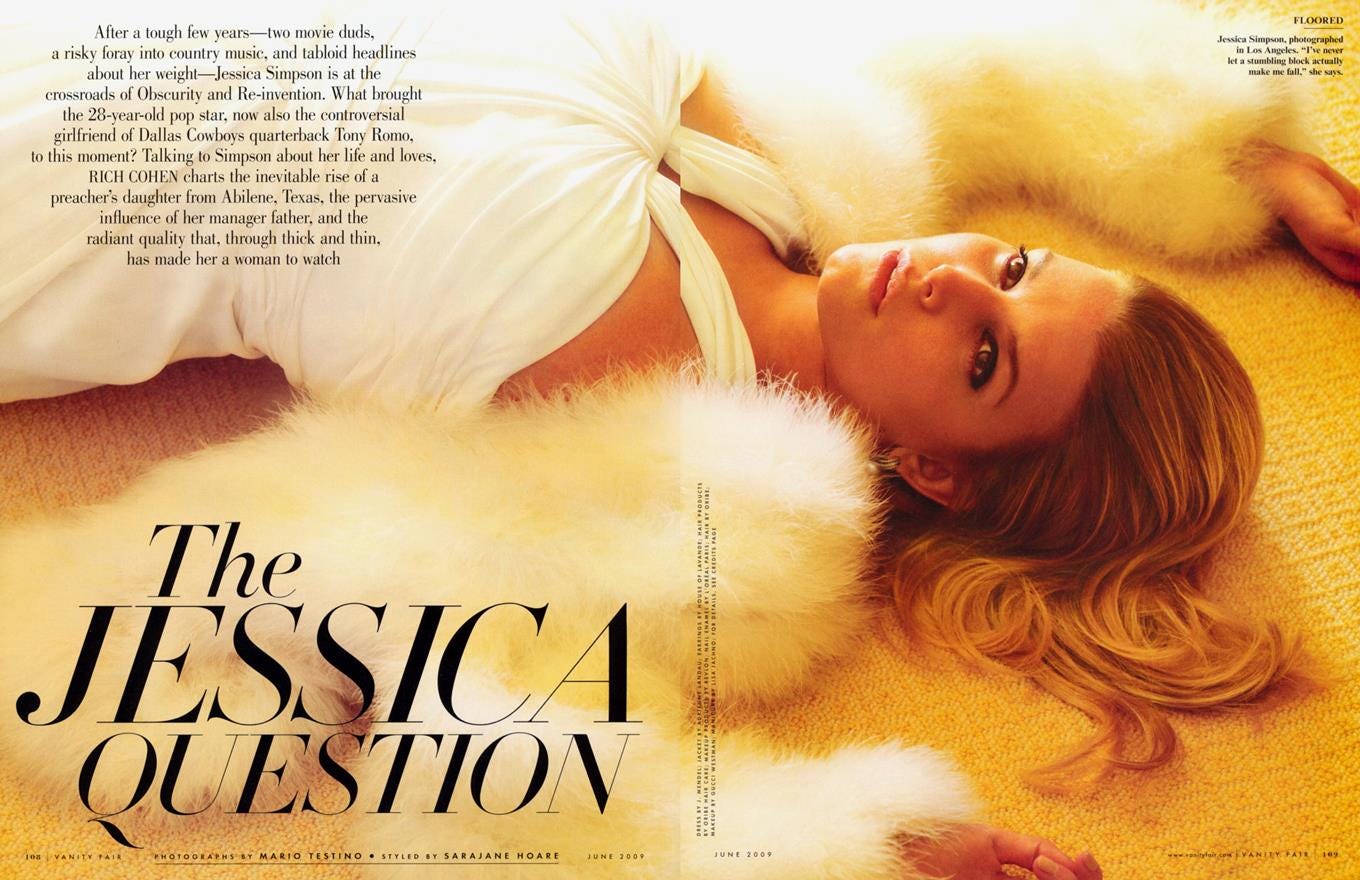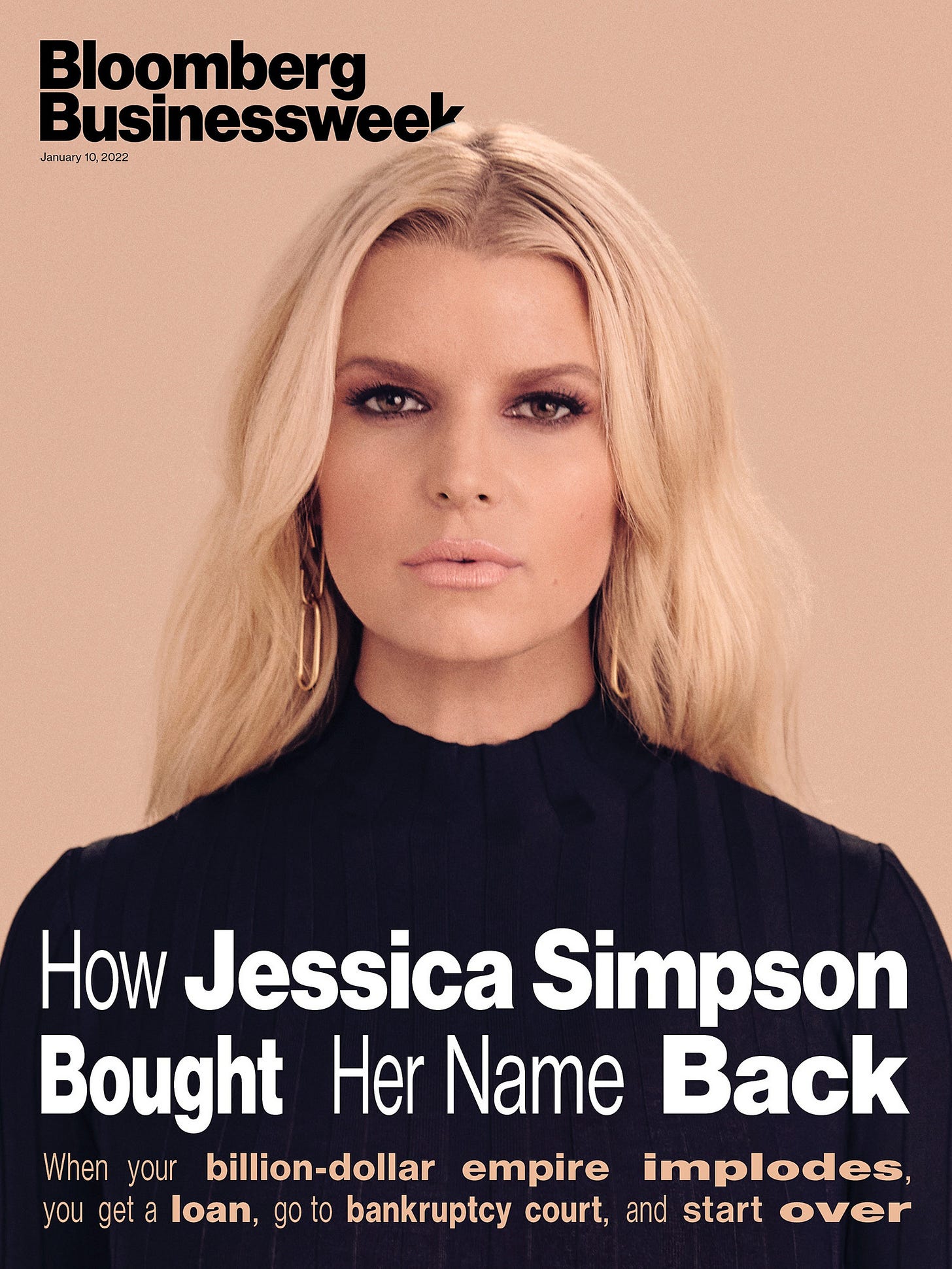Issue 8: Jessica Simpson and the Politics of 2000s Fatphobia
The mom jeans that started a firestorm and how the decade just screwed over every woman...
CONTENT WARNING: This issue discusses fatphobia and disordered eating.
Vanity Fair. "The Jessica Question." May 4, 2009. Rich Cohen.
(Image via Vanity Fair)
Jessica Simpson was never fat. I feel weird even typing that because it implies that it would have been incredibly bad for her to be so. The ways we discuss our bodies, but especially those of women, are so loaded with hatred for the mere idea of fatness that it seems as though we have to grovelingly apologize for even suggesting that someone isn’t a size zero. But it is true. Jessica Simpson was never truly plus-size if we go by the basic definitions of the fashion industry. Nor was she what would objectively be described as fat. In that moment where it seemed as though the world couldn’t stop gawking at her, Simpson was perfectly average.
The “mom jeans” incident – if we can even call it that – was so unavoidable that it became headline news on my side of the pond, where Simpson was never a major star and was mostly known for her occasional movie roles than her singing. In 2009, she performed at an event in Texas to promote her debut country album. She wore high-waisted jeans with a leopard-print belt. It was a very 2009 look. You see those pictures now and just think, hey, she looks good. For some reason, the world of that time saw a woman who had “let herself go”, a former sex symbol gone to seed who was now inexcusably large.
Rich Cohen, the guy who wrote the creepy Alicia Silverstone profile from a couple of issues back, described her as "looking less than slender, holding the microphone like a turkey leg, and wearing what were described everywhere as “mom jeans.”" Jesus, dude. As you can tell, he hadn’t learned any decorum over the years of being inexplicably popular as a profile writer. Again, Jessica is still quite skinny in these images. But Cohen, and the world at large, positioned these photos as the nadir of her career, another nail in the coffin after a couple of film flops and her country album “only” selling 200,000 copies. The Vanity Fair piece is all about her need to reinvent herself, the rush to ensure that Jessica Simpson doesn’t, as Cohen fantasizes, end up living in the suburbs with a washed-up husband “utterly forgotten.”
(“You call this fat?” Jesus f*cking Christ, even on the bloody cover…)
I actually found this profile tough to read. Not just because of the Rich Cohen of it all, although his smarmy misogyny is all over this crap. It was a painful reminder of the decade I survived my adolescence in and how institutional fatphobia saturated every corner of the media. Truly, I’m stunned that my friends and I made it out of this decade without descending into disordered eating. Look at any TV show of this era, or magazine or film or whatever, and it feels like all anyone wanted to talk about was a woman’s weight. I don’t think we’ve ever freed ourselves from this problem, but it certainly felt more virulent to me at a time when I wasn’t exactly emotionally bulletproof. You read a chapter like this:
"She didn’t want to talk about her weight, so, of course, that’s all I could think of—it gilded each question in my mind: What are you working on now [that you’re fat]? Do you see yourself as part of a class, with Christina and Britney [or are you too fat]? Do you feel that your relationship with Tony Romo has affected his performance as a quarterback [because you are fat]?"
And you can’t help but wonder what Cohen would write about your body, given the chance. But don't worry, for Cohen notes that Jessica is "skinny again" so he has no reason to ask about her weight. Praise be, he's safe from a woman in mom jeans trying to live her life. Psyche, he still wants to talk about her weight, "so I hinted at it, asking instead about body image in general, physical changes, perception—from my questions, you might have thought I was interviewing the Wolf Man." Like the cleaning of a house, it never ends. It permeates this profile, not just in Cohen’s direct admissions of his nonsense but in how her changing body is positioned as a sign of her flagging career. Her acting career didn’t flounder because it wasn’t her strength. Her country album didn’t underperform because it wasn’t good. It’s all because she was “f.a.t.”
Fatness, however narrowly it is defined by the mainstream media, is frequently equated with moral or ethical failings. It’s that bullsh*t “oh, they’re ageing so well because they’re unproblematic” line that 17-year-olds on Twitter love to throw around at anyone older than 30. Simpson had already dealt with years of being dismissed as nothing more than a dumb blonde. Much of her career was viewed through the lens of her being an acceptable punching bag because she was seen as intellectually inferior, largely because of her reality series Newlyweds, which documented the early days of her marriage to Nick Lachey. While he can’t get over her body, Cohen at least has the decency to call out the stereotype that being on Newlyweds created. Cohen also, rather savvily for once, points out that this series was produced by Jessica's father, Joe Simpson, and he had final cut over what aired. So, that image of his own kid being the ditzy virgin is partly his creation. The subtext of the show is "Joe Simpson sending a camera crew into the house where his chaste daughter is losing her chastity." Hey, remember the purity ring fad of this era? (Check out The Purity Myth by Jessica Valenti for more on this horrible era. That book was a radicalizing force in my life, true story.)
Abuse towards Simpson reached new peaks during this era as she dated an American football player named Tony Romo. I know zero about this sport but Wikipedia tells me that Romo was a major player for the Dallas Cowboys and holds several records with that team. He started dating Jessica in 2007, and after a bad performance against the Philadelphia Eagles a month later, people started blaming Simpson for his failures. It's always a woman's fault, right? So of course some butthurt football dudes nicknamed her Yoko Romo. Even George W. Bush took shots at her. The audacity! Cohen talks to a Texas Monthly writer who seems to believe that Romo's "happy-go-lucky" attitude towards the game is somehow his girlfriend's fault, because having a sense of proportion is bad, apparently. He doesn’t do much to refute this narrative either, seemingly happy to have it contribute to this notion that Jessica is flopping full-time. And you thought Taylor Swift had it bad with the creeps who want her out of her boyfriend’s place of work.
Cohen barely mentions that Simpson, at this time, was part of a multi-million-dollar business with her fashion line. Simpson lets Cohen know that it's worth "$400 million" and that "the business keeps growing" but Cohen can't stop thinking about fat Jessica failing in her mom jeans. Nowadays, the brand is what Simpson is best known for and how she’s made her fortune. It broke $1 billion in sales, which is a rarity for any company but much less a celebrity-led one. In 2022, she regained control of the institution that bore her name and is in the midst of expanding its reach into areas beyond apparel.
Today, Simpson is married, has three kids, and is focused on her business. She released her memoir in 2020, wherein she opened up about drug and alcohol dependency, the sexual abuse she experienced during her childhood, and her continuing body image issues. She still gets asked about the jeans. In her book, she notes that the public and media reaction to those pictures gave her a “dysmorphic” view of herself and exacerbated a lot of feelings she had about her body. In recent years, she’s been candid about getting sober and even shared pictures of herself at her lowest in hopes of destigmatizing addiction. She seems to be doing well. Good for her.
(Image via Bloomberg)
What was in the water in the 2000s that made this level of hysterical cruelty and body-shaming so normal? I’m not sure I have the time or psychological knowledge to fully dissect that, even though I lived through it. It’s certainly something we’ve talked about a lot on this newsletter, from the degradation of Amy Winehouse during her years of addiction to fetishizing the maple syrup diet Beyoncé went on to drop weight for a movie. We weren’t over the heroin chic ideal of the ‘90s, and diet culture was inescapable, from Slimfast to Atkins to cabbage soup. The vitriol attached to women who were smaller than average but still not a size zero was potent.
It wasn’t just Jessica’s jeans. It was What Not To Wear screaming at curvier women for wearing horizontal stripes. It was the slew of classist programming in the UK that positioned being larger as a sign of your laziness and your sponging off “hard working Brits.” It was Bridget Jones being described as overweight. It was normalizing weight loss surgery for teenagers and telling girls to just drink water rather than eat when they’re hungry. It was “Nothing tastes as good as skinny feels.” It was literally everything on America’s Next Top Model. It was words like “muffin top” or “thigh gap” or “bingo wings”, accompanied by red circles of shame around body parts on a magazine cover.
No, none of this was new to the 2000s. We can trace it back decades, I’m sure. Yet it’s the specific callousness of that decade which has left the darkest shadow looming overhead in our present day. In times of Ozempic, buccal fat removal, and “body positivity” designed only for skinny white women, the seeds of the mom jeans shame are everywhere. And skinny is back. The Kardashians have had their BBLs removed. Everyone is using a diabetes medication with weird side-effects to stave off hunger. For every Lizzo or Beth Ditto, there are dozens of people watching TikToks that create entirely new reasons for us to hate our bodies (leggings legs? F*cking really?!) I watch celebrities on the red carpet, skinnier than ever, and think, “Huh, so that’s why I thought Jessica Simpson was fat when I was a kid.” The seething disdain for those who breach the smothering confines of aesthetic acceptability haven’t loosened up. And if it’s not bodies, it’s skincare. It’s dental work. It’s always something else.
It's undeniable that we have made progress in recent years on this front. The body positivity and fat liberation movements have fought tooth and nail to change this deeply ingrained problem, and also to battle for wider bodily autonomy pertaining to healthcare and such. It’s never just about beauty, of course. Fatphobia in the real, non-celeb, world is pernicious and often dangerous, as many fat women whose doctors refused to fully examine them and blamed all their issues on fatness can attest to. I do believe that we wouldn’t see the same kind of wall-to-wall fury about Jessica Simpson’s weight had those pictures been taken today, or, at the very least, the backlash would be immediate. Certainly, it wouldn’t be an international incident. Still, it speaks volumes that we’re still talking about this, that Jessica cannot help but be reminded of it over and over and that is still defines her in 2024. After all, when I googled her for this piece, “weight loss” was a suggested search.
Thanks so much for reading the latest issue of the Gossip Reading Club. You can find my work littered across the internet. Over on Pajiba, I reviewed Bob Marley: One Love (spoiler, it’s not good), I talked about Naomi Watts deserving better, and I went in on Justin Timberlake blowing up his chance at a semi-respectable comeback. On Inverse, I talked about the anniversary of House on Haunted Hill and how it pioneered the movie theatre gimmick. For Paste, inspired by Lisa Frankenstein and Poor Things, I delved into the feminist history of Mary Shelley’s Frankenstein.
If you don’t want to pay for a subscription but would still like to support me, I have a Ko-Fi account! Thanks again to everyone for subscribing! If you’re a paid subscriber, you’ll get weekly gossip summaries as well as the book club. Our next read is You’ll Never Eat Lunch in This Town Again!









I have one conspiracy theory that I believe in and it's not really a conspiracy, rather it's the way women are pitted against each other. It starts at the 1998 Emmy Awards where Calista Flockhart wore an open backed dress. Jennifer Anniston was interviewed on that red carpet and I remember her looking around and saying this "There are people here making me feel fat.". I do believe that Calista is naturally thin and the stress of being on tv caused her to lose even more weight. I also believe that on that red carpet an invisible gauntlet was thrown and picked up by a large number of working actresses. The previous year, Picture Perfect came out and Jennifer looks amazing in it but the following year, she was significantly thinner, all the actresses on Friends got thinner as the show went on. Sarah Michelle Geller got much thinner on Buffy after 1998, pretty much every young actress lost weight and was praised for it in the media. The early 2000's just fed off that and introduced a new level of fat shaming (which always existed, I remember when the actresses on The Facts of Life were called The Fats of Life and not understanding it because I thought they were the most beautiful girls I'd ever seen) that was exacerbated by tabloid tv and US Weekly and it's competitors. Actresses internalized this physique and it trickled down. There was a bit of backlash when the media decided to go after Calista that was not couched in any concern for her health but rather blaming a woman for other women's desire to look like her even if they had to hurt themselves to do it. If you have ever seen her 1999 interview with Connie Chung you know what I mean. It was the media patting itself on the back for usually fat shaming women by saying "Look! We pointed out that this one actress is too thin so we're doing a feminism now here's an ad for Nutrisystem (which Jennifer Anniston worked for when she just starting out)".
The best thing about the Bridget Jones book was that when she is at her lowest weight, she's also at her lowest point and deeply unhappy. The book doesn't highlight it but it's there if you are keeping track of her posted weight, I've never seen the film so I don't know if that is in it. A number on a scale didn't fix anything.